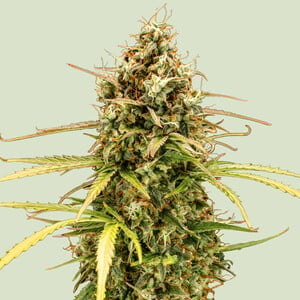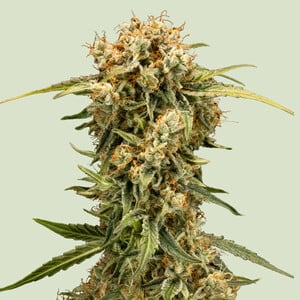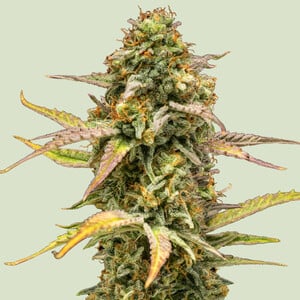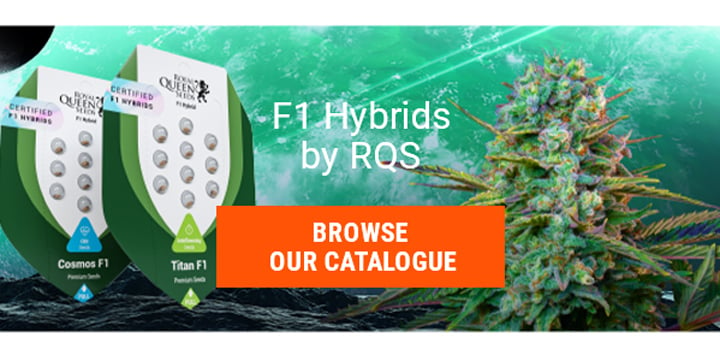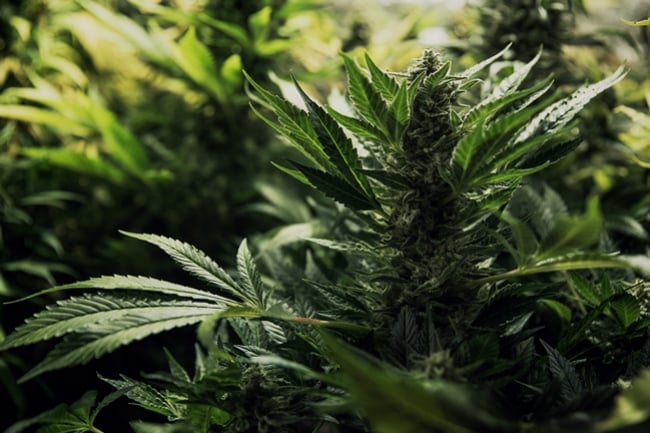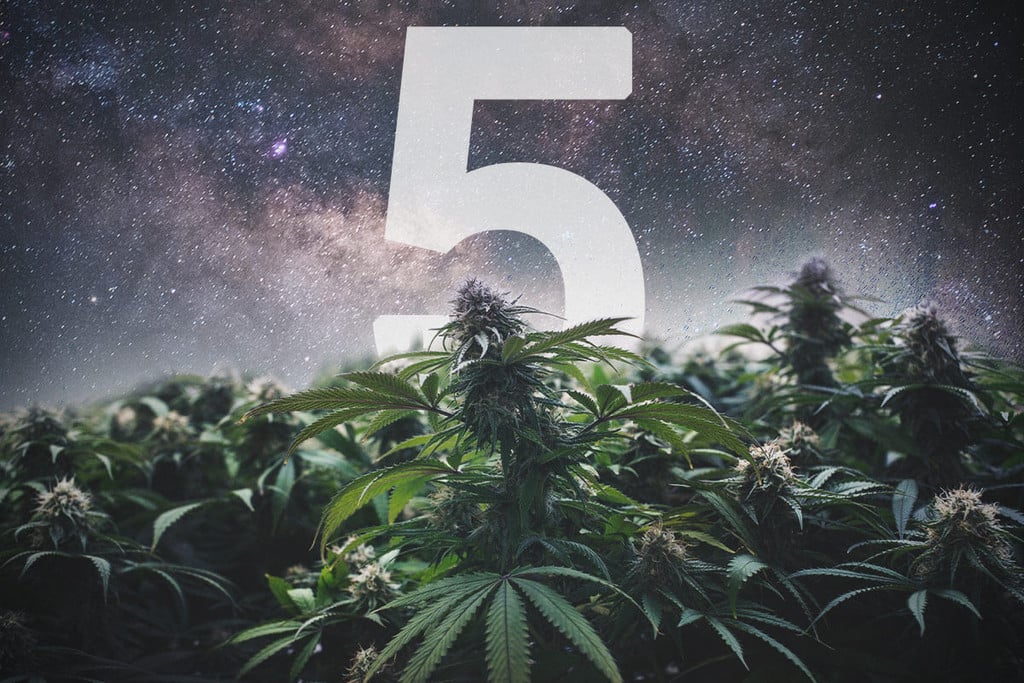.
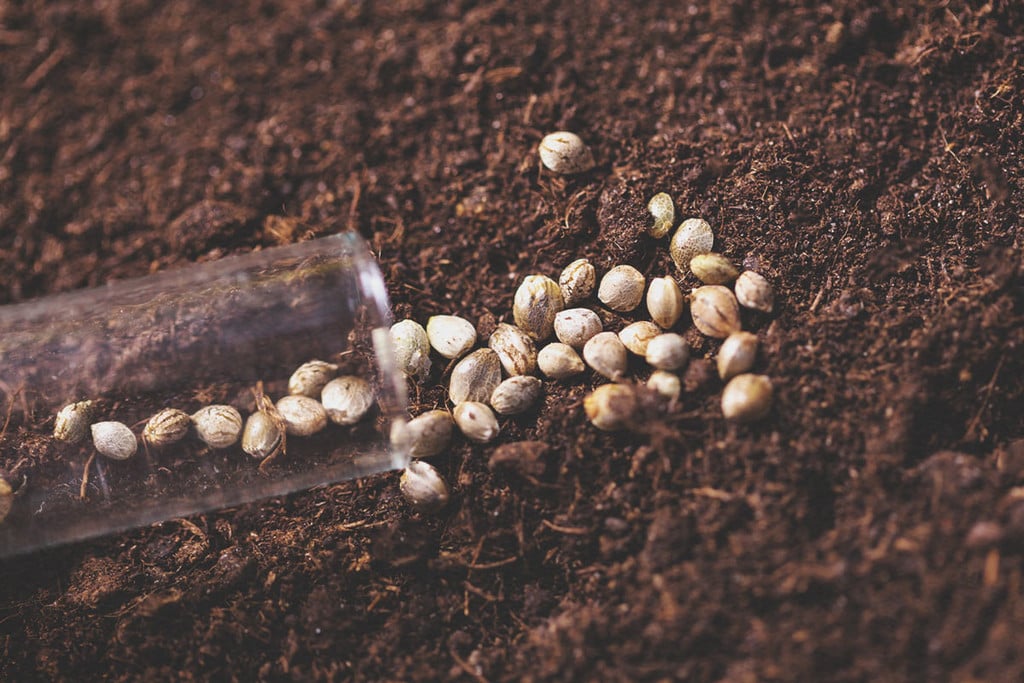
F1 Hybrid vs Open-Pollinated Cannabis Seeds: Pros and Cons
Do you prefer F1 hybrid cannabis seeds? Or are you an old-school heirloom appreciator? If these terms flew over your head, then you're about to learn everything you need to know below. By the time you reach the bottom of the page, you'll know which type of seeds best meets your needs in the grow room or garden.
It’s no secret that there are thousands of cannabis varieties available, all of which belong to specific categories. Two of these categories are F1 hybrids and heirlooms. But how do these groups differ, and what are their distinct advantages and downsides?
Contents:
- What is the difference between f1 hybrid and heirloom cannabis seeds?
- What are f1 hybrid cannabis seeds?
- What are the advantages of f1 hybrid cannabis seeds?
- What are the disadvantages of f1 hybrid cannabis seeds?
- What is heirloom cannabis?
- What are the advantages of heirloom cannabis?
- What are the disadvantages of heirloom seeds?
- Which is better: f1 hybrid or heirloom cannabis?
What Is the Difference Between F1 Hybrid and Heirloom Cannabis Seeds?
F1 hybrid cannabis seeds are new to the world of weed. These seeds produce highly uniform plants that are able to churn out huge yields of terpene and cannabinoid-packed buds. In contrast, heirloom seeds are among the oldest varieties available; they have a rich history and have given rise to many modern strains on the market. Heirlooms don’t compare to F1s when it comes to potency, but they’re a great choice when looking to breed weed or become a more self-sufficient grower.
What Are F1 Hybrid Cannabis Seeds?
F1 hybrid cannabis varieties are more robust, productive, and potent than standard strains. They’re created through an intensive breeding programme that harnesses pure parent inbred lines (IBLs) to create varieties that offer consistent phenotypes. Growers outside of the cannabis realm have used F1 hybrid seeds for decades. From corn and squash to lettuce and radishes, these crops deliver bigger yields and more uniform crops.
It took much longer for F1 hybrids to enter the world of weed, but breeders at Royal Queen Seeds eventually cracked the code. Technically, F1 hybrids aren’t “strains” at all. Instead, they’re the offspring of two IBLs; breeders have to continually cross both parents in order to produce the same F1.
Overall, F1 hybrid cannabis seeds offer several key benefits:
- Excellent uniformity
- Bigger yields
- Superior disease resistance
- Increased levels of cannabinoids and terpenes
How to Create F1 Hybrid Cannabis Seeds
As mentioned, F1 hybrid cannabis seeds are created through a complex breeding process. After selecting two distinguished parents with desirable traits, breeders continually cross each parent with itself until they produce two highly pure IBLs. Both of these lines feature high homozygosity. Put simply, this means that all of the plants within the same generation share many of the same traits, making them almost identical.
After developing two IBLs, breeders then cross them with each other. The offspring of this cross are referred to as the first filial generation, or F1 for short. Over time, breeding an IBL with itself gives rise to a phenomenon called inbreeding depression, which results in decreased performance. However, crossing two IBLs results in a reinvigoration of genetics and subsequent hybrid vigour.
F1s possess traits from both parents but display them in exactly the same way. Therefore, all plants from the same F1 cross are incredibly uniform, which makes them attractive to commercial and hobby growers alike.
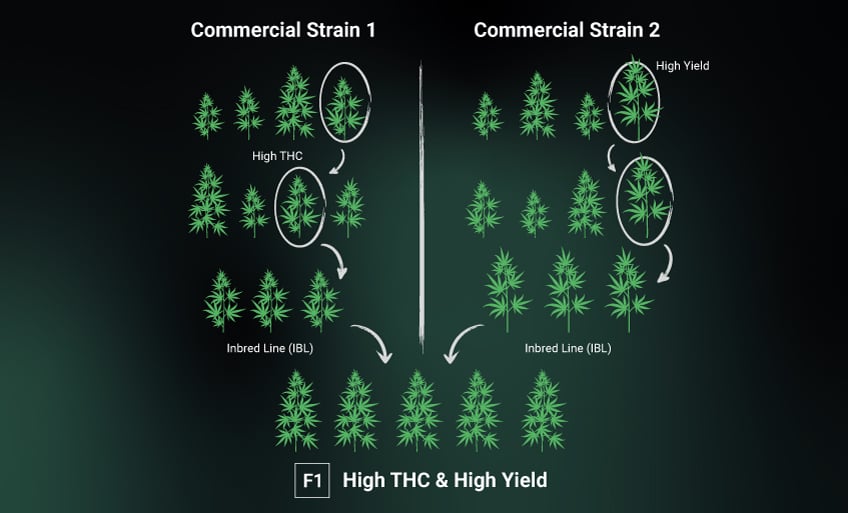
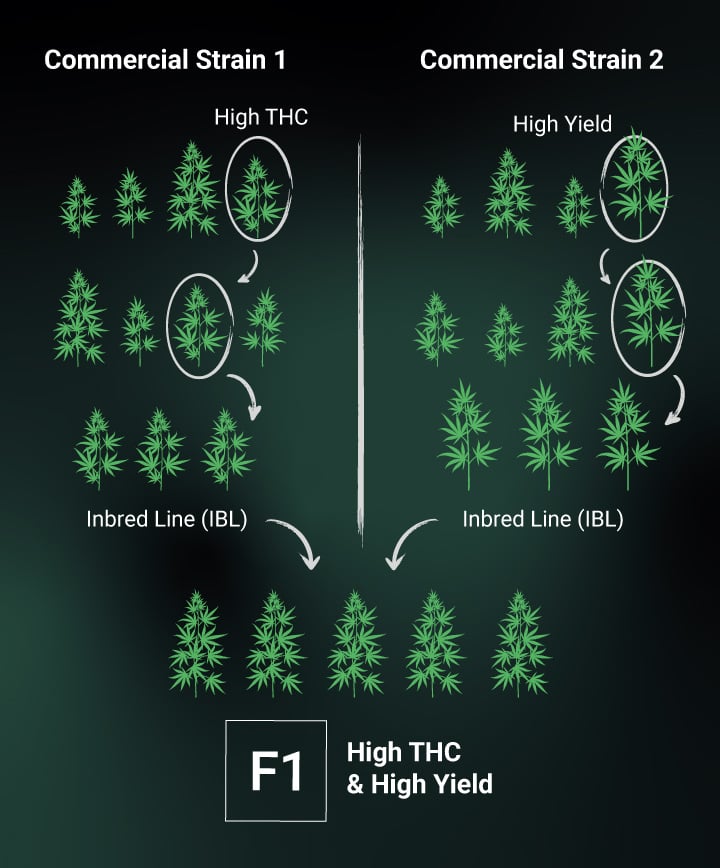
Examples of F1 Hybrid Cannabis Seeds
The first wave of true F1 cannabis hybrids made history. This exciting new category of genetics offers previously unheard of uniformity and disease resistance. Get to know three of the leading genetics below.
Milky Way F1

This powerhouse autoflowering F1 variety stems from IBLs created using Blue Mammoth, Blue Dream, and Sin Tra Bajo Auto genetics. With a height of just 1.8 – 2.5 feet, Milky Way F1 makes the perfect choice for growers seeking stealth. High levels of THC paired with the terpenes farnesene, myrcene, and pinene make for a hard-hitting and creative high.
Milky Way F1
|
|
Blue Mammoth x Blue Dream x Sin Tra Bajo Auto |
|
|
42 - 45 days |
|
|
THC: Very high |
|
|
Creative, Euphoric, Physically Relaxing |
|
|
70 - 75 days after germination |
Medusa F1

Not only does Medusa F1 contain enormous levels of THC, but she delivers enough CBG to give you a taste of this novel cannabinoid. This autoflowering F1 charges through the entire growing cycle in as little as 70 days while maintaining a compact height of 2 – 3 feet. Enjoy tastes of blueberry and mint alongside a fast-acting sleepy high.
Medusa F1
|
|
Sugar Magnolia x American Beauty |
|
|
40 - 45 days |
|
|
THC: Very high |
|
|
Balanced, Creative, Physically Relaxing, Sleepy |
|
|
70 - 75 days after germination |
Hyperion F1

There’s a lot of hype around Hyperion F1, and deservedly so! This autoflowering F1 hybrid delivers astronomical levels of THC and a battery of terpenes that unleash tastes of earthiness, pepper, pine, and herbs. Prepare your noggin’ for plenty of laughter, followed by sleepy and stoning effects. At a height of just 23.4 inches following training, she’ll churn out enough buds to fill your stash jars to the rim.
Hyperion F1
|
|
Amnesia x Lemon x Sin Tra Bajo Automatic |
|
|
50 - 55 days |
|
|
THC: Very high |
|
|
Laughter, Motivating , Physically Relaxing, Sleepy |
|
|
80 - 85 days after sprouting |
What Are the Advantages of F1 Hybrid Cannabis Seeds?
You better believe that all of the effort it takes to generate F1 hybrid cannabis seeds is well worth it. These varieties outperform traditional strains in almost every area. Their hardy nature also makes them particularly forgiving, and thus perfect for beginners looking to dip their toes into cannabis cultivation.
1. Hybrid Vigour
Also known as heterosis, hybrid vigour occurs in the offspring of two IBLs. This unique trait underpins the stellar performance observed in F1 hybrids. Researchers are still trying to understand exactly what causes this beneficial phenomenon, but it appears that the suppression of detrimental traits and the production of new gene combinations play a role. Overall, hybrid vigour results in enhanced growth, fertility, and uniformity.
2. More Predictable and Stable
The unparalleled uniformity of F1 hybrids makes them highly desirable to commercial operations; growers have a much easier time growing on a large scale when all of their plants share the same height, structure, and yield. The erasure of poor-performing specimens also saves a lot of money. However, this benefit also comes in handy for home growers seeking consistent results every time they sow seeds. Because they are so strikingly uniform, growing F1 seeds serves as a cheaper and easier alternative to cloning.
3. Better Resistance
You can do everything right during the grow cycle and still see your plants suffer from disease. Thankfully, F1 hybrid cannabis varieties minimise this threat. As they inherit a greater number of disease-resistant genes from their parents, F1s exhibit superb resistance to pathogens. Furthermore, their innate hybrid vigour equips them with enhanced immune function.
4. Bigger Yields
Many growers thoroughly enjoy the cultivation process, but the main goal of growing weed boils down to one thing: yield. While some traditional strains are undeniably productive, results vary from phenotype to phenotype. The novel gene combinations and hybrid vigour of F1 hybrids result in greater productivity that drastically improves the return on investment when growing cannabis.
5. Increased Cannabinoid and Terpene Production
Both cannabinoids and terpenes fall into the category of secondary metabolites—compounds not directly involved in growth and reproduction, but vital for defense and survival. The genes inherited from parent IBLs recombine in new ways within F1 hybrids, resulting in the coding of enzymes[1] that are responsible for creating secondary metabolites. Not only does this equip F1 hybrids with better chemical defenses, but it also results in more potent effects and intense flavors.
What Are the Disadvantages of F1 Hybrid Cannabis Seeds?
Now you’re aware of the key benefits of F1 hybrid cannabis seeds. These varieties are undeniably impressive, but do they have any downsides? Like everything in life, F1 hybrids do come with several disadvantages that make them less suitable in some circumstances.
1. Breeding Effort
As you’ve seen, it takes a lot of effort to breed the IBLs required to produce a generation of true F1 hybrid cannabis seeds. Not only that, but breeders continuously sustain the parent lines in order to keep producing the same F1 hybrid. If they lose just one IBL due to disease or any other reason, they’ll lose the ability to create the same F1. This process requires a lot of time, money, and effort. As such, home growers are unlikely to achieve F1s on their own, and must rely on seed companies in order to obtain these genetics.
2. Not Suited for Breeders
These cold, hard facts ultimately mean that F1 hybrids remain out of reach for most hobbyist breeders. While possible, the process takes much more work than simply crossing two hybrid varieties and pheno-hunting for a mother plant to clone. The main limiting factors include cost, space, and equipment.
3. More Expensive
It doesn’t matter what you’re buying—from clothes to computers, better products are more expensive. The same logic applies to F1 hybrid cannabis seeds. The time and money that goes into creating F1 hybrids, as well as their myriad benefits, naturally means that these seeds cost more than traditional strains.
4. Misinformation
Misinformation is rife within the cannabis industry. This applies to everything from the very idea of “strains” to terms such as “indica” and “sativa”. Unfortunately, the same also applies to F1 hybrid cannabis seeds. If you’ve ever browsed an online seed bank, you’ll have come across the term “F1” well before true F1 hybrids became available. However, outside of true F1s, this tag simply denotes the first generation from a cross between two hybrids, not between pure IBLs.
What Is Heirloom Cannabis?
As you can guess by their name, heirloom seeds are varieties that have been passed down over generations of growers. To qualify as an heirloom, a cultivar must have a heritage[2] within a family or community, and a history of around 50 years or more. These varieties are passed down and preserved because they display desirable traits. They are open-pollinated, meaning they reproduce through natural means, and seeds grow true to type, in that progeny closely resemble the parent plants.
Examples of Heirloom Cannabis Seeds
Heirloom cannabis seeds have a long history of cultivation, and breeders have used them as the genetic foundation for some of the most well-known strains around today. The most famous of these heirloom varieties include:
- Acapulco Gold: This energising strain hails from the Acapulco region of Mexico. Famous for its peppery taste and stimulating high, breeders have used it to give rise to countless different varieties.
- Colombian Gold: After emerging from its namesake nation, this variety quickly gained recognition for its pungent terpenes, and has contributed genes to the world-renowned Skunk #1.
- Panama Red: Packed with THC and myrcene, this old-school lady gained notoriety for her intense and almost psychedelic effects.
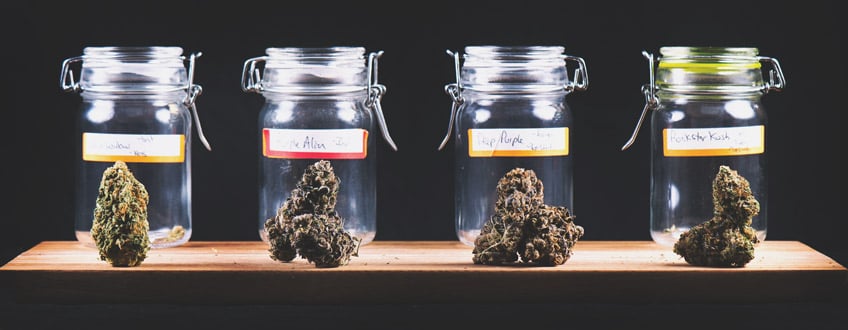
What Are the Advantages of Heirloom Cannabis?
Heirloom seeds have played a fundamental role in horticulture, farming, and market gardening over the last few centuries. Even today, many growers flock to these varieties because of their impressive stability and ability to grow true to type. Discover their primary benefits below.
1. Naturalness
Purist cultivators are drawn to heirloom cannabis seeds because of their relatively untampered-with genetics. While many modern strains are intensively bred to produce ridiculous levels of THC and terpenes, heirloom weed strains are closer to their original wild relatives (known as landraces). Instead of blowing your mind and increasing the odds of experiencing anxiety, these varieties deliver a more subtle high.
2. Stability
Heirloom seeds are heavily inbred. In order to ensure that the offspring display the same traits as their heirloom lineage, growers need to separate plants from other varieties to ensure they don’t accidentally become pollinated. Done right, this ensures a genetically stable crop with consistent phenotypes.
3. Suited for Breeding
Heirloom varieties are great candidates for breeding. Because of their highly stable genetics, growers will have a good idea of some of the traits that the progeny will inherit. Crossing two heirloom varieties will have a similar effect to crossing two IBLs, in that it involves a reversal of inbreeding depression that triggers a degree of hybrid vigour within the offspring.
What Are the Disadvantages of Heirloom Seeds?
Heirloom seeds are stable, great for breeding, and provide a more "natural" high that many weed lovers adore—but they’re not perfect. Heirloom seeds have several downsides that make them less desirable than traditional strains and F1 hybrids in some scenarios.
1. Less Resistance Compared to Hybrids
Decades of inbreeding means many heirloom varieties display inbreeding depression—a trait that results in reduced performance. On top of this, their open-pollinated nature means they’re not selectively bred to resist common plant pathogens.
2. Moderate THC and CBD Levels
Heirloom cannabis varieties are less potent than their intensively bred counterparts. While some users value them for their reduced levels of cannabinoids, it's a big turn-off for others; don’t expect to get royally baked after firing up these buds.
3. Not Suited for All Climates
Many heirloom strains have adapted to specific regions of the world. While they’re great at growing in these places, they often underperform when cultivated in other regions that are far more warm, cold, humid, or dry than their home turf.
Which Is Better: F1 Hybrid or Heirloom Cannabis?
It depends on the grower. Whether you favor heirlooms or F1 hybrid cannabis seeds all boils down to preference. If you grow for big yields, plenty of terpenes, and potent flowers, then you’ll value F1 hybrid seeds above all else. Their hybrid vigour and disease resistance also make the task of growing much easier. If you prefer more mellow highs and the ability to produce seeds that grow true to type, then heirloom varieties will fit the bill perfectly.
- The effect of hybridization on secondary metabolites and herbivore resistance: implications for the evolution of chemical diversity in plants | SpringerLink https://link.springer.com
- Heirloom Seeds https://www.seedsavers.org


























